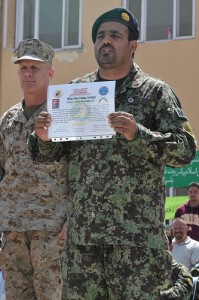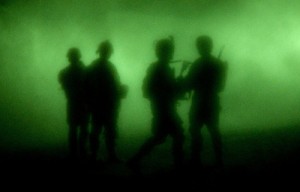Agreement in Principle Signed on Handover of Afghan Prisons, Night Raid Agreement to be Separate
Creating conditions dangerously close to those under which we have been warned that Lindsey Graham’s head will explode, the US and Afghanistan have signed an agreement in principle on the handover of prisons to Afghan control. The negotiations were carried out under the pressure of dual deadlines, with Afghan President Hamid Karzai having put today as his deadline for insisting on an agreement and President Obama declaring that an agreement had to be in place before the upcoming NATO summit in Chicago.
The agreement appears to use semantics to say that the prisons are being handed over today, but with the reality being that there will be a gradual process taking six months. From the New York Times:
The memorandum of understanding would officially hand over control of detainees to an Afghan official as of Friday, but would also allow for a six-month period of transition to full Afghan control of the American-held detainees, American officials said.
As a practical matter, American officials are expected to maintain day-to-day control over the 3,200 detainees, most of them suspected Taliban insurgents.
During the six months, custody of the American-held prisoners would gradually transfer to Afghan authority, with the first 500 prisoners to be transferred within 45 days, according to American military and diplomatic officials who spoke on condition of anonymity as a matter of policy.
The move is a major concession to the Afghans, but the Americans will retain ultimate veto authority over releases of any insurgent detainees as long as American troops are in Afghanistan, and will continue to monitor humane treatment of the prisoners, the American officials said.
With the US maintaining veto power over release of any prisoners, perhaps Senator Graham will have to hold off on throwing his next tantrum, as his major objection to the handover had been that the Afghans would release prisoners who would immediately attack US troops. It’s not clear how the US will be monitoring humane treatment of the prisoners, since it is US training that put the torture methods in place to begin with.
There is no indication in this Times article, or in articles from AP carried in the Washington Post or the Reuters article about the signing of the prison agreement on when an agreement on night raids is expected. The night raid issue appears to be the one remaining sticking point that needs to be addressed before the long term status of forces agreement can be established for laying out the ground rules after the expected US withdrawal from Afghanistan late next year. Presumably, the Obama administration will be pushing to have both the night raid agreement and status of forces agreement in place before the May NATO summit.
Oh, and those non-Afghan prisoners we’re holding at Bagram that the US wants us all to forget about? They stay under US control, of course.


